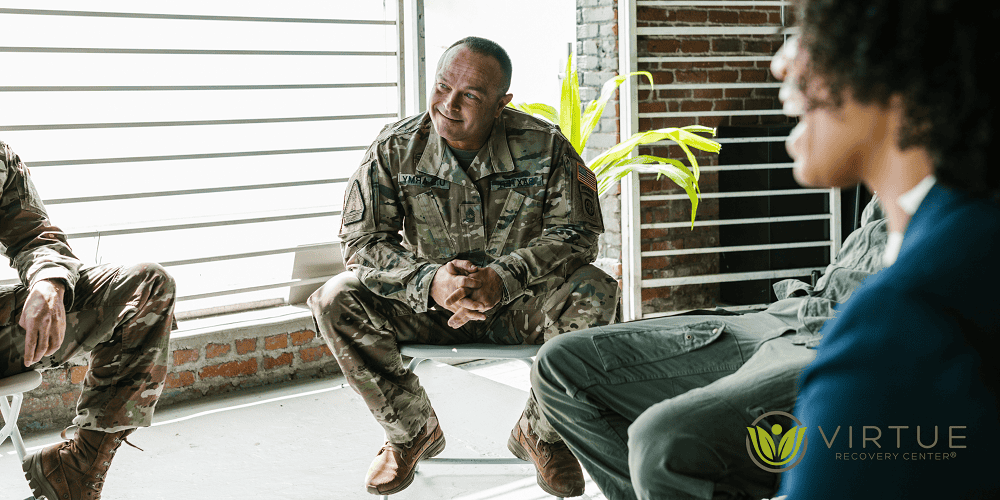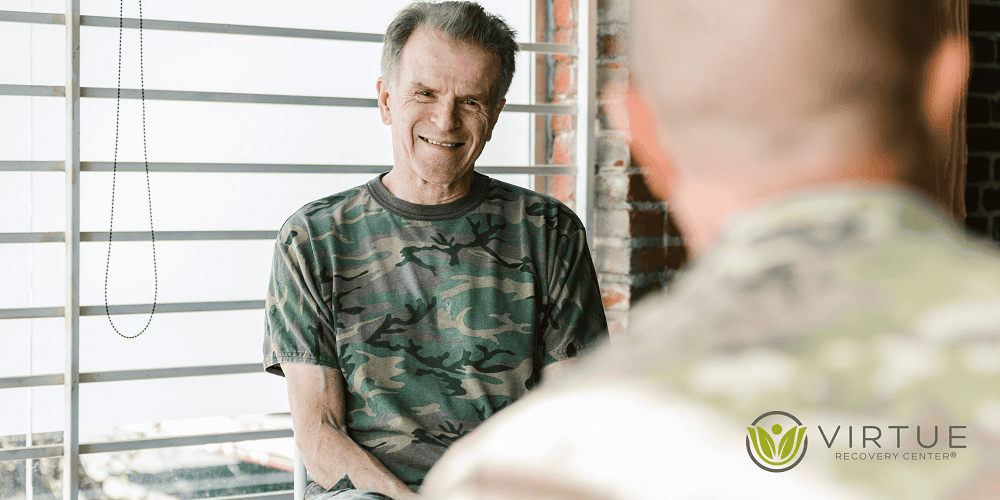Key Takeaways
- Veterans are more likely to drink again because of depression and trauma-related triggers.
- To be effective, relapse prevention treatment must deal with both the mental and physical aspects of recovering from addiction.
- Rehab centers in Chandler offer specialized services tailored to Veterans, taking into account their unique military experiences and needs.
- Tools like HALT (Hungry, Angry, Lonely, Tired) are crucial for identifying and addressing factors that can lead to relapse.
- Veterans are more likely to stay sober after going to rehab for alcohol addiction and depression care.
Introduction
Many Veterans don’t stop fighting after their service; they keep fighting inside, often through depression and addiction. People use alcohol to deal with trauma, stress, or loneliness. Many Veterans have to deal with a problem that is just as hard as detox or finishing a rehab program: staying sober. Veterans are more likely to relapse than the general population, especially when they are depressed and want to drink. This shows how important it is to have comprehensive relapse prevention treatment that goes beyond just helping Veterans on the surface and gets to the emotional and psychological wounds they carry (VA/DoD Clinical Practice Guidelines, 2021).Why Do Veterans Have a Higher Risk of Going Back to Drinking?
PTSD, depression, moral injury, and anxiety are some of the invisible scars that Veterans often bring back from service. These internal fights make it very likely that people will self-medicate with alcohol. Even after getting sober at first, things that happen in military life or civilian life can make you want to drink again. Here are some common reasons why Veterans go back to using drugs:- Unresolved trauma from serving in the military or combat
- Long-term depression and lack of emotional connection
- Being alone and cut off from civilian life
- No structure after leaving the military
- Co-occurring disorders, such as chronic pain or anxiety
What Is HALT, and How Does It Help Stop People From Relapsing?
The HALT method, which stands for Hungry, Angry, Lonely, and Tired, is a fundamental tool for preventing relapse. These four emotional or physical states often make people act on impulse, which can include using drugs. For Veterans, being aware of these states can help them stop and change their behavior before they have a relapse:- Hungry: Not getting enough nutrients can cause mood instability. Veterans should be encouraged to eat regular meals and maintain a balanced diet.
- Angry: Unresolved anger, especially if it comes from trauma, can make you want to hurt others or self-medicate. It’s essential to learn how to deal with anger and get help for trauma.
- Lonely: It’s common to feel alone after service. Community support or group therapy can help you fight loneliness.
- Tired: Being mentally or physically tired makes it harder to resist cravings. Taking care of your sleep, getting enough rest, and managing chronic pain are all essential components of recovery.
What Does Treatment for Relapse Prevention Involve?
Saying “no” to alcohol isn’t the only thing you can do to avoid a relapse. It’s about making a life where you don’t need alcohol anymore. A good relapse prevention program uses more than one method:- Behavioural therapy: Veterans learn how to recognise the signs of relapse and how to manage them effectively. CBT and DBT are two types of treatment that can help change the way you think and make you less impulsive.
- Mapping triggers: Veterans can name specific things that might make them relapse, like loud noises, crowds, anniversaries of bad things that happened, or feelings of worthlessness.
- Making a routine: Life in the military is organized. Often, civilian life isn’t. Setting up daily routines can help reduce chaos and make things more predictable.
- Peer support and community: Group therapy and alumni networks provide a sense of brotherhood and understanding, which is crucial for preventing relapse when you’re feeling lonely.
- Care for the body and mind: Taking medicine for depression or alcohol cravings and checking in regularly makes sure that both the mind and body are getting the help they need.
- Building skills and aftercare: As part of relapse prevention, Veterans are equipped with the necessary tools to reintegrate into society, including job skills, effective communication strategies, and ongoing accountability.
Why Should Veterans Go to Rehab Centers in Chandler, AZ?
Numerous recovery centers in Arizona cater to Veterans, but Chandler stands out due to its specialized care for Veterans. These centers are familiar with military culture and adjust their treatment plans accordingly. Some of the main benefits are:- Trauma-informed therapists lead group therapy sessions just for Veterans
- Access to trauma therapy for PTSD caused by combat
- Different types of programs, such as inpatient, outpatient, and partial hospitalization
- Continuity of care for both mental health and addiction
- Options for holistic healing include Yoga, Equine therapy, and mindfulness.

How Does Rehab for Alcohol Addiction Help People Stay Sober for a Long Time?
Alcohol addiction rehab sets the stage for sobriety, but every step of the way, from detox to discharge planning, there must be ways to stop people from relapsing. Full programs include:- Medical detox to safely deal with withdrawal
- Individualized treatment plans for people with both depression and anxiety
- Veterans in long-term recovery can be peer mentors.
- Ongoing counseling to help with emotional processing and making changes to your life
Conclusion
For Veterans who are dealing with depression and cravings for alcohol, relapsing isn’t a sign of weakness; it’s a sign that they need to heal more deeply. When you have wounds from service, especially when they are combined with emotional isolation and unresolved trauma, you need more than just willpower. That’s why preventing relapse needs to be planned, tailored to each individual, and based on their unique circumstances and emotions. At Virtue Recovery Chandler, we honor Veterans by giving them the help they need to deal with both their alcohol addiction and the emotional pain it causes. We have rehab centers in Chandler, AZ, that offer specialized programs that combine the HALT method, trauma therapy, and holistic care to help people stay sober. Call us at 866-338-5779 right away if you or a loved one is a veteran who needs caring, professional help.How Can Trauma-Informed Care Support Veterans in Relapse Prevention for Alcohol Cravings?
Understanding traumainformed care in addiction recovery is essential for supporting veterans facing alcohol cravings. This approach recognizes the profound impact of trauma on behavior and decision-making, providing a safe and supportive environment. By addressing underlying issues and fostering resilience, veterans can effectively manage cravings and reduce the risk of relapse.
FAQs
What is different about relapse prevention for Veterans?
Veterans often have unique triggers, like PTSD, survivor’s guilt, and stress from reintegrating into society. To keep Veterans from relapsing, these emotional and mental layers must be dealt with.What effect does depression have on drinking again?
Veterans who are depressed may be more likely to have cravings, especially when they are alone or feeling very sad. It is harder to stay sober if you don’t treat your depression.What does the HALT method mean in addiction recovery?
Hungry, Angry, Lonely, and Tired are four crucial emotional and physical states that can lead to relapse. Recognizing and dealing with them can stop you from acting on impulse.Is it possible for relapse prevention treatment to involve medication?
Yes, for sure. Medication can be beneficial for Veterans who have both depression and alcohol cravings because it can help them keep their mood stable and lower their risk of relapse.Resources:
-
- Substance Use Disorder Treatment: Complementary Approaches. Whole Health Library, U.S. Department of Veterans Affairs, updated 2023, https://www.va.gov/WHOLEHEALTHLIBRARY/tools/substance-use-disorder-treatment-complementary-approaches.asp
-
- Cognitive Processing Therapy for Veterans with Comorbid PTSD and Alcohol Use Disorders. PubMed Central, U.S. National Library of Medicine, https://pmc.ncbi.nlm.nih.gov/articles/PMC3855895/
-
- Management of Substance Use Disorder (SUD) (2021). VA/DoD Clinical Practice Guidelines, U.S. Department of Veterans Affairs and Department of Defense, 2021, https://www.healthquality.va.gov/guidelines/MH/sud/








